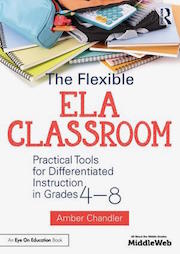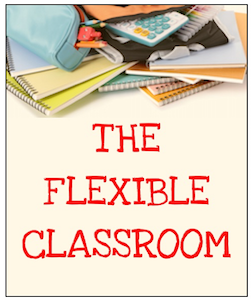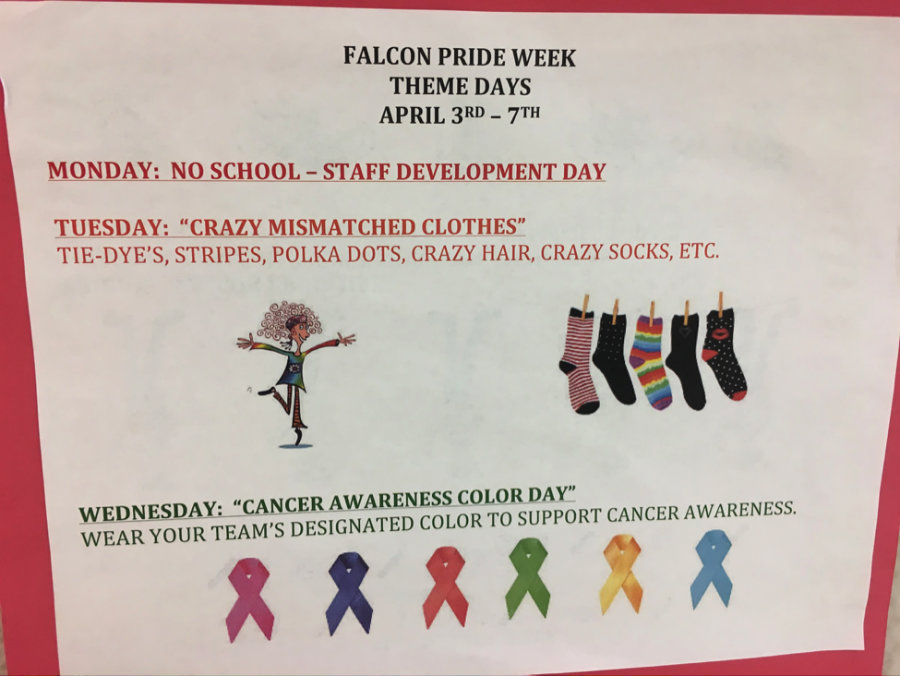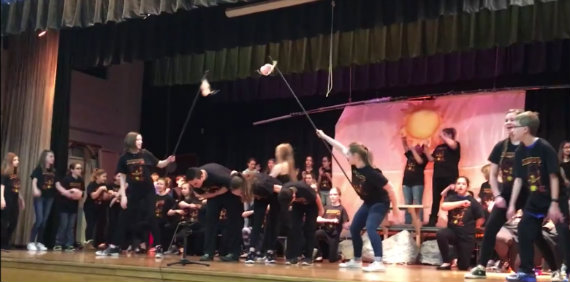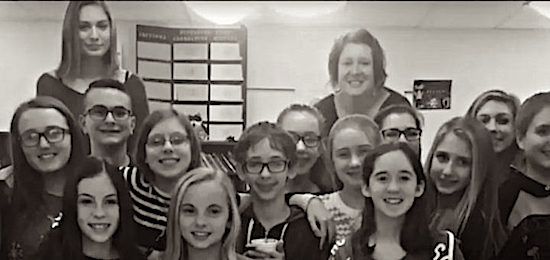Why Spirit Week Matters to Middle Schoolers
A MiddleWeb Blog
Falcon Pride Day is my favorite day of the year.
It is an assembly the day before our Easter Break to celebrate the best parts of being a Frontier Middle School student or teacher.
All week is a spirit week, with dress-up days like crazy hair or mismatched socks. The finale of the week is one-part competition, one-part team building, and one-part controlled chaos.
There is some friendly teacher vs. student competition (teachers won!) and team competitions with challenges like wrapping a member in toilet paper to look like a falcon, bottle flipping, and the Falcon Feud.
This year the drama club did a preview of the upcoming Lion King Jr production. The Character Club advisors and club members create an exciting day of recognition for those who have won character awards, and even crown a Mr. and Miss Falcon.
Click image for Lion King Jr. video!
Seriously? Crazy week?
Yes, we “miss” class time. Yes, we get the kiddos all riled up. No, we are not able to control all the students in the auditorium to act exactly as we wish. When we show team videos, kids are going to clap and hoot and holler, even though, (gasp!) we told them to hold their applause. No, this is not on a curriculum map. No, it is not measurable, at least not in the traditional way.
My team’s video
(I’d argue that my team won, in part, because we were able to get the crowd to cheer the loudest. We needed all the help we could get since bottle flipping is normally the bane of my existence, and I actually had to do it for the competition. It’s harder than it looks!)
Changing the middle school dynamic

Miss and Mr. Falcon
We complain that students are disinterested. We complain that they don’t have relationships and that they hide behind texting. We complain that school is rote, curriculum confining, and testing a drain on our time and energy.
Yet, when there is a chance to change that dynamic through activities such as pep rallies, spirit games, team pride days, or field days, there are always teachers who complain.
I want to ask them, “What are you doing that is more important than this?” As for me, on the day before a break, I can’t think of a better way to spend our time. This is what middle school is all about.
My own evolution
I have a confession though. I used to be that teacher who complained when my lesson plans were disrupted. I had things to teach, right?
I wanted my students to do well. I wanted to make sure I covered everything I was supposed to, and I wanted to preteach, scaffold, reteach, and push my students to achieve excellence. The problem though was that my head kept me from truly experiencing the power of teaching with heart.
For some reason, the emphasis on teacher preparation – at least as I’ve experienced it – is on classroom management, lesson plan writing, and being able to accurately cite the standards. Though I know these are important factors in a teacher’s success, I’ve come to learn that if teachers are going to love their work and want to stay in the classroom, we must forge relationships with colleagues AND students.
As you all know, middle school students need so much more than a cerebral approach. My journey to a Flexible Classroom really began when I realized that I had to get to know the kids, and I learned to differentiate to meet their individual talents and needs. This approach has been life-altering for me and my students. But sometimes I catch myself looking at teaching from the perspective of a strategist and planner. I’ll do whatever it takes to help students learn, which is certainly a step in the right direction.
But, even after this shift, I’ve had another realization that I’ve been writing about this year. I’ve started to look at how social and emotional needs are at least as important as the academic. This is happening, in part, because I’m experiencing a new aspect of middle school, close up and personal.
Suddenly, a different perspective
My daughter entered middle school this past fall – my school, where I have taught for 15 years – and I suddenly had a completely different lens by which to view day-to-day life at the middle level. Our conversations during our daily commute have given me a whole new way to look at what’s important to middle school kiddos.
For instance? Here’s a sampling: student council elections, school dances, field trips, Spirit Games, making class t-shirts, her violin and chorus concerts, the art show, and the play.
Also (she says, animatedly) can I believe that if Student Council raises enough money, our principal will have to go Bald for Bucks? Mrs. Johnson, her Home and Careers teacher, dabbed to get the class’s attention. Her study hall teacher is so funny, but not in a lame way. There are annoying people “shipping” her with this boy she can’t stand (like, “relationshipping” by pairing up who would make a cute couple).
This list changes from day to day, and week to week, but the emphasis is always on parts of school that no one person owns – more the way the school feels or the people who impact a particular day. Like it or not, this is the stuff that matters to middle schoolers, not to mention a plethora of home life issues that we often don’t know about.
Entering the kids’ world for fun and learning
I’ve realized that the sooner I meet them in that complicated and chaotic world where they live, the better I’ll be able to make learning ELA memorable and important – something a curriculum map, lesson plan, or test could never do.
Some of the lessons that I’ve tried this year are directed towards getting to know my students on a deeper level. I’d love to hear what you do to connect with students. Send your ideas and links in the comments. I’d love to feature your great ideas on my website!
__________________________
